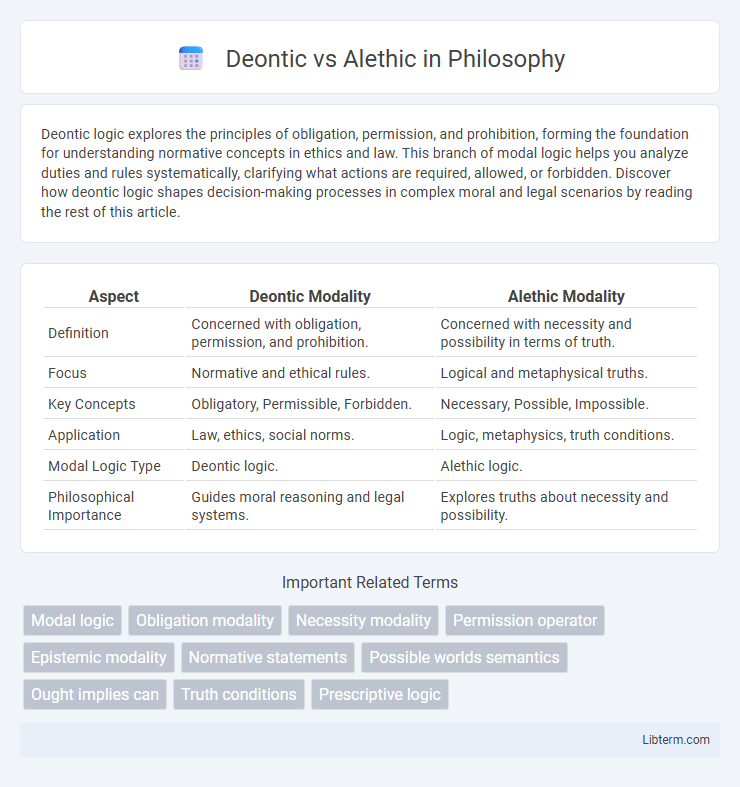Deontic logic explores the principles of obligation, permission, and prohibition, forming the foundation for understanding normative concepts in ethics and law. This branch of modal logic helps you analyze duties and rules systematically, clarifying what actions are required, allowed, or forbidden. Discover how deontic logic shapes decision-making processes in complex moral and legal scenarios by reading the rest of this article.
Table of Comparison
| Aspect | Deontic Modality | Alethic Modality |
|---|---|---|
| Definition | Concerned with obligation, permission, and prohibition. | Concerned with necessity and possibility in terms of truth. |
| Focus | Normative and ethical rules. | Logical and metaphysical truths. |
| Key Concepts | Obligatory, Permissible, Forbidden. | Necessary, Possible, Impossible. |
| Application | Law, ethics, social norms. | Logic, metaphysics, truth conditions. |
| Modal Logic Type | Deontic logic. | Alethic logic. |
| Philosophical Importance | Guides moral reasoning and legal systems. | Explores truths about necessity and possibility. |
Understanding Deontic and Alethic Modalities
Deontic modalities pertain to necessity and permission related to rules, obligations, and ethical norms, shaping how actions are evaluated within moral or legal frameworks. Alethic modalities address truth conditions such as possibility, necessity, and impossibility, underpinning logical and metaphysical reasoning about reality. Understanding the distinction between deontic and alethic modalities clarifies how language navigates normative versus factual dimensions.
Defining Deontic Modality: Obligation and Permission
Deontic modality centers on concepts of obligation and permission, expressing what is required, allowed, or forbidden within a normative framework. It evaluates actions based on rules, duties, or ethical standards, such as legal obligations or social norms. Unlike alethic modality, which deals with necessity and possibility concerning truth and reality, deontic modality governs normative judgments and behavioral expectations.
Exploring Alethic Modality: Necessity and Possibility
Alethic modality explores the concepts of necessity and possibility, dealing with what must be true or what can be true based on logical, metaphysical, or physical laws. It differentiates between necessary truths, which hold in every possible world, and contingent truths, which may vary depending on circumstances. Understanding alethic modality aids in evaluating propositions concerning certainty and potentiality within philosophical logic and modal semantics.
Key Differences Between Deontic and Alethic Modalities
Deontic modality concerns permissions, obligations, and prohibitions, reflecting norms and rules that govern behavior, while alethic modality pertains to necessity, possibility, and logical truths related to states of reality. Deontic modality is centered on what ought to be done based on ethical or legal standards, whereas alethic modality deals with metaphysical or logical necessity and possibility independent of human action. The key difference lies in deontic modality's normative focus versus alethic modality's focus on epistemic and ontological truths.
Linguistic Markers of Deontic and Alethic Modalities
Deontic modality is primarily expressed through linguistic markers such as modal verbs like "must," "should," and "ought to," which indicate obligation, permission, or prohibition within a social or normative context. Alethic modality employs modal verbs including "can," "may," and "must," but these relate to logical necessity, possibility, or impossibility, denoting truth conditions rather than social rules. Distinguishing between these modalities in language hinges on context and the semantic roles these modal verbs play in conveying normative versus epistemic or logical meanings.
Practical Examples of Deontic and Alethic Usage
Deontic modality is used to express obligations, permissions, and prohibitions, such as in statements like "You must wear a seatbelt" or "Employees may leave early on Fridays." Alethic modality relates to necessity and possibility concerning truth or logic, exemplified by sentences like "It is necessary that the sun rises in the east" or "A triangle can have only three sides." Practical usage of deontic modality often appears in legal or ethical contexts, while alethic modality is common in scientific and mathematical reasoning.
Role in Philosophy and Logic: Deontic vs Alethic
Deontic logic focuses on normative concepts such as obligation, permission, and prohibition, playing a crucial role in moral philosophy and legal reasoning by formalizing ethical and legal norms. Alethic logic centers on modalities related to truth, necessity, and possibility, essential for metaphysics and epistemology as it addresses the nature of truth and logical necessity. Both systems provide distinct frameworks for analyzing different types of modal statements, with deontic logic handling normative modalities and alethic logic dealing with truth-functional modalities.
Deontic Modality in Legal and Ethical Contexts
Deontic modality encompasses expressions of duty, obligation, and permission, playing a critical role in legal and ethical contexts by framing what actions are required, allowed, or forbidden. Legal texts frequently employ deontic modal verbs such as "must," "shall," and "may" to codify rules and regulations, defining normative expectations and responsibilities. Ethical discussions utilize deontic modality to articulate moral imperatives and principles, guiding behavior through concepts of right and wrong.
Alethic Modality in Scientific and Factual Statements
Alethic modality expresses necessity, possibility, and impossibility within scientific and factual statements, reflecting objective truths and logical relations rather than subjective obligations. In scientific discourse, alethic modality is crucial for articulating laws of nature, theoretical possibilities, and empirical certainties, ensuring clarity in hypotheses and proven facts. This modality underpins the logical structure of scientific reasoning, distinguishing what must be true from what may be or cannot be true based on evidence and logical consistency.
Implications for Semantic Interpretation and Analysis
Deontic modalities, concerning obligation and permission, shape semantic interpretation by embedding normative contexts that influence meaning and truth conditions in discourse analysis. Alethic modalities, related to necessity and possibility, affect semantic analysis by framing statements within logical constraints of truth across possible worlds. Understanding distinctions between these modalities refines the precision of semantic models, enabling more accurate parsing of meaning in natural language processing and formal semantics.
Deontic Infographic

 libterm.com
libterm.com